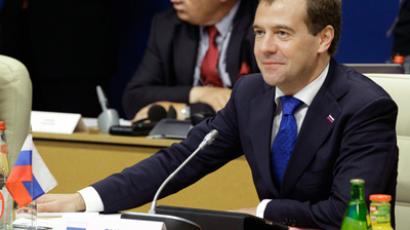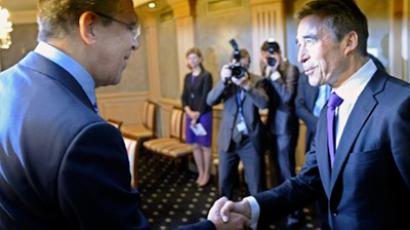Gaddafi should not have been killed - Lavrov
Foreign Minister Sergey Lavrov on Friday responded to a broad array of questions by listeners of the Voice of Russia, Radio Russia and Ekho Moskvy radio stations.
Opening the Q&A session, Lavrov responded to the situation in Libya, where former Libyan leader Muammar Gaddafi died following a gun battle between government loyalists and members of the National Liberation Army. Lavrov said Gaddafi had lost his legitimacy long ago, but his death on Thursday evokes some serious questions."It is no accident that the Office of UN High Commissioner on Human Rights stated today that all circumstances of his (Gaddafi's) death must be investigated and I fully agree that such an investigation will be conducted," Lavrov said in a live interview broadcast by Echo of Moscow, the Voice of Russia, and Radio Russia radio stations.Lavrov stressed that in compliance with international law, the moment that a party to an armed conflict is captured special procedures should be applied to him or her, including assistance, as well as a ban on killing such a person.The Russian Foreign Minister said that it appeared from video footage that the former Libyan leader was killed only after his capture."The footage that we saw on TV indicates that he [Gaddafi] was really captured when he was injured and that later, already in captivity his life was taken away from him," he said.Lavrov also said that NATO’s aerial attack on Gaddafi's convoy as it was attempting to leave Sirte did not conform to the letter of the UN mandate to guarantee a no-fly zone above Libya set by UN Security Council resolution #1973.In the Foreign Minister’s opinion, the attack on Gaddafi's convoy was directly at odds with the agreed task of guaranteeing a no-fly zone, especially "as in this specific case one cannot speak of protecting the lives of civilians either because the convoy did not attack anyone."Meanwhile, there would have been far less bloodshed in Libya if Western countries had accepted an African Union initiative for settling the Libyan crisis, Lavrov has argued. "Unfortunately, the initiative of the African Union for organizing negotiations between [the regime of Muammar Gaddafi and the opposition] was not supported, primarily by Western countries, which had by then apparently embarked on a course of defeating the Gaddafi regime by armed force," Lavrov said.The Russian Foreign Minister said the decision not to use the initiative of the African Union came at a great loss of life."I think that, if the African initiative had been taken up and put to use, Gaddafi would still have been removed as a result, but that goal would have been achieved at the cost of a lot fewer human lives," he said.Meanwhile, Russia expects the new Libyan authorities to build relations with Russia within the framework of the agreements that were reached earlier, Lavrov said."We want to build relations based on respect for the treaties and agreements that have already been concluded between our countries,” the minister said. “Representatives from the National Transitional Council have clearly confirmed to us that they will follow this very logic." Lavrov then touched briefly on the ongoing turmoil sweeping Syria, warning that the Western approach to that crisis might provoke a repeat of the Libyan scenario."There are serious differences on Syria in the United Nations Security Council," the Russian foreign minister acknowledged.
Missile Defense in Eastern Europe
Lavrov gave careful consideration to the question of a US missile defense system planned for Eastern Europe, a project that has the potential to not only ruin the Russia-US reset, but spark an actual arms race.The Foreign Minister said that Russia would not participate in the project unless it receives legally-binding guarantees that the system will never be aimed at Russian territory. Thus far, Washington has balked on this demand."We are continuing consultations,” he said, “but I don't see any chance for any joint actions until it is clearly stipulated in legally-binding terms that this is not targeted against us.” Russia has repeatedly warned its western colleagues that the development of a missile defense system in Eastern Europe, without Russia’s full participation in the project at the developmental and operational stages, will be necessarily viewed as a potential threat to its national security.In May, President Dmitry Medvedev told reporters at the G-8 Summit in France that unless the US and NATO came to an acceptable agreement with Russia over missile defense, “a real arms race will begin by 2020.”Lavrov said that Russia will give an appropriate military response if its demands are not taken into account, but said such a scenario would be unfortunate because we would "miss an opportunity to move beyond the Cold War."Lavrov also mentioned that Russia has invited US President Barack Obama for a visit, but no dates have yet been set."President Obama has an invitation, and we will be glad to organize such a visit, but no agreement has yet been reached on the dates," he said.
'The Kurils will remain Russian territory'
Lavrov then responded to questions concerning the South Kuril Islands, which have been a source of a territorial dispute between Russia and Japan since the end of World War II. The Foreign Minister said the islands will remain part of Russia, adding that the current deployment of state-of-the-art weapons on the islands is part of a major plan to modernize Russia's armed forces."As regards the stationing of a battery of surface-to-air-missile systems, tanks and helicopters, this is happening throughout the territory of the Russian Federation, [everywhere] where there are military garrisons," he said. "Obsolescent armaments are being replaced with new armaments. It is not a process unique to the Kuril Islands. We have to dispose of old rubbish, of course.""I can't see any reason to say that we are trying to turn the Kurils into an impregnable fortress. The entire country must an impregnable fortress. Our borders must be securely protected," the minister said.The Kurils were, are and will be part of our territory under decisions based on the results of World War II, he added.At the same, however, Russia wants to maintain strong economic and political relations with its easterly neighbor."We want to make full use of the potential of our relations with Japan as a major and very important neighbor,” he said. “We are developing a useful political dialogue, a political dialogue that is based on quite a lot of confidence.”Russia and Japan continue to enhance their economic cooperation as well, Lavrov added.














